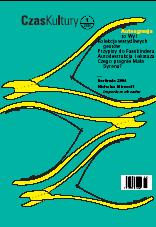Przypisy do Fassbindera. Barthes. Foucault. Girard -Jeu de massacre et désire
Notes to Fassbinder. Barthes. Foucault. Girard – Jeu de massacre et désire
Author(s): Robert KulpaSubject(s): Fine Arts / Performing Arts
Published by: Stowarzyszenie Czasu Kultury
Keywords: Kulpa: Notes to Fassbinder. Barthes. Foucault. Girard; Fassbinder’s works as an impulse to create the viewers’ own reality; The film Querelle; an image of sado-masochistic love; Fassbinder’s films; an impulse to search for one’s own identity/happiness;
Summary/Abstract: Establishing one’s own unique reality seems a sensible solution to the limitations imposed by the modern world. Feeling lost due to the prevailing social order which makes people act out rigid roles in life is not an abstract concept. Rainer Werner Fassbinder’s films provide viewers with an opportunity to become aware of the almost inherent necessity of creating one’s own existence. In interviews the director himself declared that in fact he was making one and the same film all the time since they all focused around the same existential questions which always remained unanswered. Querelle, 1982, which was strongly criticised, touches the key issue of searching for one’s identity lost in mouldy social stereotypes. The desire for unity is to be fulfilled by love (homosexual love and incest). The relationship between the main character and his brother, however, becomes sado-masochistic. Violence and pleasure are equal elements of their relationship which breaks all social rules. The motive of sacrifice is continuously combined with the motive of rape (René Girard). The beautiful idea of attaining a state of being identical to oneself through another person is brutally wounded by reality, similarly to the way in which the passionate lovers “give birth to the obscenity of their relationship” (Roland Barthes). Trying to achieve happiness means exceeding the limits which have been determined by society. Existence becomes a continuous transgression (Michel Foucault). Hidden desires, dreams and fantasises overcome the hitherto darkness and this is what Fassbinder’s works seem to talk about.
Journal: Czas Kultury
- Issue Year: 2004
- Issue No: 01
- Page Range: 41-55
- Page Count: 15
- Language: Polish
- Content File-PDF

